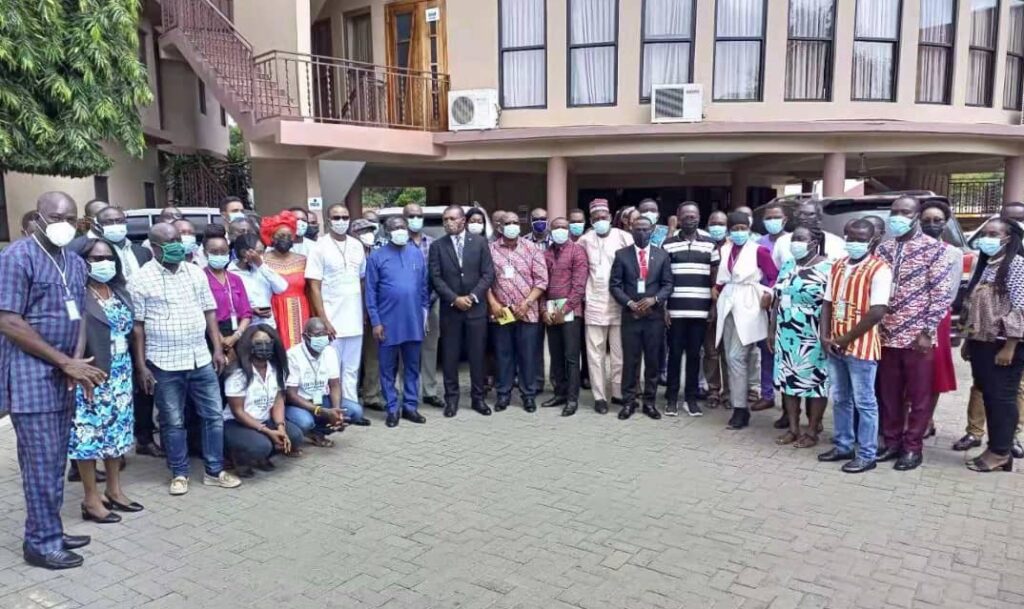INBAR West Africa Regional Office (WARO) hosted a 2-day regional symposium on bamboo and rattan development in Africa under the theme Investing in Bamboo as a Productive Sector of the Economy.
The event which started from 22-23 July 2021 in Accra forms part of activities under the China-IFAD South-South Triangular Cooperation (SSTC) Facility which seeks to improve bamboo and rattan value chain conditions through increased awareness, improved policy framework, investment promotion and enhance knowledge transfer between technical experts from beneficiary countries.
The Event
The event brought together investors, entrepreneurs, policymakers, programme managers, smallholder farmers, standard developers and civil society leaders to dialogue and forge road maps to promote trade, and the establishment of a vibrant bamboo and rattan economy in Africa.
Participants from Benin, Cameroon, Ethiopia, Ghana, Kenya, Liberia, Nigeria, Rwanda, Sierra Leone and Tanzania during the symposium shared ideas and knowledge on bamboo and rattan innovations as well as local technologies that can transform the resources into high-quality competitive market products.
The demand and use of bamboo and rattan based products are growing rapidly worldwide and INBAR together with its partners are enabling African countries to add value to their resource in order to tap into fast growing productive green economy.
The symposium had presentations by key speakers on the following sub thematic development areas:
• Capitalising on bamboo’s emerging market;
• Innovations and technologies for bamboo development;
• Bamboo for eco-friendly living;
• Mainstreaming bamboo into national development policies and programme;
• Bamboo and rattan standards development;
• Rattan production and consumption system in West and Central Africa

Addressing participants at the opening ceremony of the symposium, Deputy Minister of Lands and Natural Resources, Benito Owusu BioGhana, emphasized the need for African countries to take advantage of the opportunities presented by the African Continental Free Trade Agreement to boost investment and trade in the bamboo and rattan sector.

“We must also capitalise on the presence of the African Continental Free Trade Area (AfCFTA) to develop a globally competitive bamboo and rattan industry to sustain the growth and development of bamboo and rattan resources across the continent”. -Hon. Benito Owusu Bio.
He also acknowledged the inclusion of bamboo and rattan in the Green Ghana Initiative which has a restoration planting target of 2000 hectares per annum using bamboo and rattan. The initiative is part of Ghana’s broad plan to find sustainable solutions to landscape management challenges in Ghana with reference to land degradation, deforestation and forest degradation.
At the end of the two-day event, participants through a brainstorming session under the key sub-thematic areas proposed among others, some of following key recommendations to improve the bamboo and rattan sector in Africa.
• Enhancement of bamboo and rattan skills development training for artisans;
• Research and technology transfer particularly in housing construction technologies;
• Provision of incentives for manufactures of high end bamboo products to improve trade;
• Establishment of bamboo and rattan artisanal hubs to enhance processing, training and innovative product development;
• Establishment of plantations to boost resource base to facilitate investment;
• Mainstreaming bamboo and rattan into national development plans, policies and climate change adaptation and mitigation programmes;
• Sustained engagement with stakeholders by policy and development institutions to strengthen collaboration and partnership to grow the industry.
INBAR organises forums such as this to support bamboo and rattan development, foster partnership and enhance knowledge exchange within member states to improve the sector.
It is expected that participants will go back to their home countries with information and ideas harnessed from the symposium to improve their advocacy and businesses within the bamboo and rattan value chain.
source: myghanadaily


